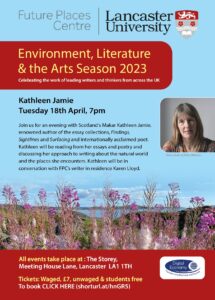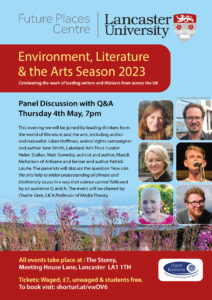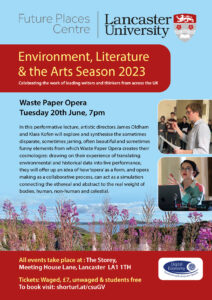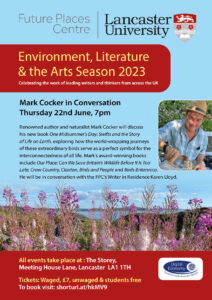Karen Lloyd introduces the programme for this year’s FPC Environment, Literature and the Arts season 2023, taking place over the next few months in Lancaster.
Back in 2021, my first job as Lancaster’s Future Places Centre writer in residence was to organise the FPC Environmental Essay and Poetry competition. The aim was to find and reward writing that was a revelatory force for helping us to see the natural world — and our place in it — differently. This was much less about nature as a kind of theatrical backdrop for personal recovery and more about the essay and poetry as restorative acts in the field of literature.
Things came nicely full circle when poetry prize-winner Jane Burn (whose winning entry you can read here) returned to Lancaster this January to run a community writing workshop and to perform her poetry in an evening reading. Jane’s events launched the FPC Environment, Literature and the Arts season 2023. Jane is a force of and for nature, and her work navigates all the complicated ways we sense and connect with it.
The season continues on Tuesday 18th April with acclaimed poet and essayist Kathleen Jamie. Kathleen will be reading and talking about her work, alongside the places and species she encounters. Scotland’s Makar, Kathleen’s publications include essay collections, Findings, Sightlines and Surfacing and poetry collections The Tree House, The Overhaul and The Bonniest Companie.

Some of the North West’s leading writers and thinkers join forces for a panel discussion on Thursday 4th May, including author, animal rights activist and councillor Jane Smith, Lakeland Arts Trust curator Helen Stalker, visual artist, food activist and co-founder of Barrow’s ArtGene Maddi Nicholson and young activist and author Matt Sowerby. From much further afield — Northern Greece — we also welcome Wainwright prize shortlisted author and naturalist Julian Hoffman.

In June we’re hosting a performative lecture by James Oldham and Klara Kofen, artistic directors of Waste Paper Opera. Their performance will explore the disparate, sometimes jarring, often beautiful and sometimes funny elements from which the company creates their unusual cosmologies. Translating environmental and historical data into live performance, Oldham and Kofen suggest how ‘opera’ as a form, and opera making as a collaborative process, connects the ethereal and abstract with the human, non-human and celestial.

Later the same week Mark Cocker will be in conversation about his new book, One Midsummer’s Day: Swifts and the Story of Life on Earth. Mark will explore how the world-wrapping journeys of these extraordinary birds serve as a perfect symbol for the interconnectedness of all life. His award-winning books include Our Place: Can We Save Britain’s Wildlife Before It Is Too Late, Crow Country, Claxton, Birds and People and Birds Britannica.

Unless otherwise specified, all events take place at The Storey Institute in Lancaster town centre. Please click on the link on each poster to book.
All FPC events are open to the public, and it’s this open engagement which sits at the core of our work. Earlier this spring a number of us contributed to a series talks for the Arnside Institute covering local food production, soils and carbon, Timescapes, saltmarsh, the marine ecosystem of Morecambe Bay and microplastics. All these talks are available to watch here.
The winners and finalists in the FPC Environmental Essay and Poetry competition can be found in the online anthology here.